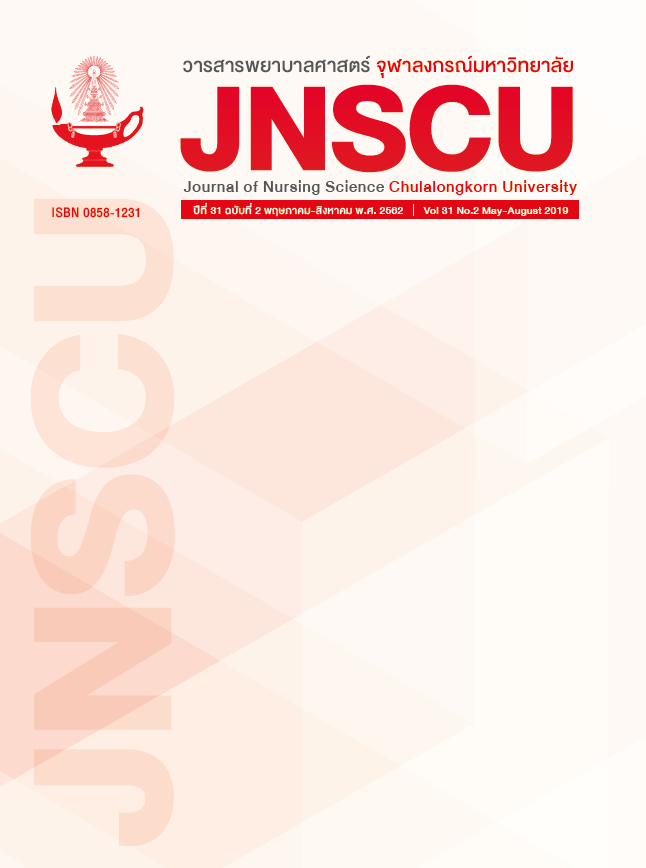ผลของโปรแกรมการสอนแนะในการปรับเปลี่ยนพฤติกรรม สุขภาพต่อระดับน้ำตาลเฉลี่ยสะสมในเลือด ของผู้ที่มีภาวะก่อนเป็นเบาหวาน
คำสำคัญ:
ภาวะก่อนเบาหวาน, ระดับน้ำตาลเฉลี่ยสะสมในเลือด, การสอนแนะบทคัดย่อ
วัตถุประสงค์: เพื่อศึกษาผลของโปรแกรมการสอนแนะในการปรับเปลี่ยนพฤติกรรมสุขภาพต่อระดับน้ำตาลเฉลี่ย
สะสมในเลือดของผู้ที่มีภาวะก่อนเป็นเบาหวาน
รูปแบบการวิจัย: การวิจัยกึ่งทดลอง
วิธีดำเนินการวิจัย: กลุ่มตัวอย่าง คือ ผู้ที่มีภาวะก่อนเป็นเบาหวานจำนวน 60 ราย ซึ่งมารับบริการที่คลินิกผู้ป่วยนอก
แผนกอายุรกรรม โรงพยาบาลพระจอมเกล้า จังหวัดเพชรบุรี แบ่งเป็นกลุ่มทดลองและกลุ่มควบคุม กลุ่มละ 30 ราย
จับคู่ให้มีคุณสมบัติใกล้เคียงกันในเรื่อง เพศ อายุ และการใช้ยาเมทฟอมิน กลุ่มควบคุมได้รับการพยาบาลตามปกติ
ส่วนกลุ่มทดลองได้รับโปรแกรมการสอนแนะในการปรับเปลี่ยนพฤติกรรมสุขภาพ เครื่องมือที่ใช้ในการวิจัย ได้แก่
โปรแกรมการสอนแนะในการปรับเปลี่ยนพฤติกรรมสุขภาพโดยใช้แนวคิดการสอนแนะของ Hass (1992) เก็บรวบรวม
ข้อมูลด้วยแบบบันทึกข้อมูลส่วนบุคคล ค่าระดับน้ำตาลเฉลี่ยสะสมในเลือด และแบบประเมินการปรับเปลี่ยน
พฤติกรรมสุขภาพของผู้ที่มีภาวะก่อนเป็นเบาหวาน ซึ่งมีค่าความตรงตามเนื้อหาเท่ากับ 0.9 และมีค่าความเที่ยง
0.71 วิเคราะห์ข้อมูลโดยใช้ร้อยละ ค่าเฉลี่ย ส่วนเบี่งเบนมาตรฐาน และทดสอบด้วยสถิติที
ผลการวิจัย: 1) ค่าเฉลี่ยของระดับน้ำตาลเฉลี่ยสะสมในเลือดของผู้ที่มีภาวะก่อนเป็นเบาหวานภายหลังได้รับโปรแกรม
การสอนแนะในการปรับเปลี่ยนพฤติกรรมสุขภาพต่ำกว่าก่อนการทดลองอย่างมีนัยสำคัญทางสถิติที่ระดับ .05
2) ค่าเฉลี่ยระดับน้ำตาลเฉลี่ยสะสมในเลือดของผู้ที่มีภาวะก่อนเป็นเบาหวานภายหลังได้รับโปรแกรมการสอนแนะ
ในการปรับเปลี่ยนพฤติกรรมสุขภาพ ต่ำกว่ากลุ่มที่ได้รับการพยาบาลตามปกติ อย่างมีนัยสำคัญทางสถิติที่ระดับ .05
สรุป: โปรแกรมการสอนแนะในการปรับเปลี่ยนพฤติกรรมสุขภาพทำให้ระดับน้ำตาลเฉลี่ยสะสมในเลือดของผู้ที่มี
ภาวะก่อนเป็นเบาหวานลดลงได
เอกสารอ้างอิง
Aekplakorn W, et al. Thai National Health ExaminationSurvey, NHESV. Nonthaburi: HealthSystemsResearchInstitute;2014.
Srichang N. Prediction of Type 2 Diabetes Population in Thailand, 2011-2020. Weekil Epidemiological Surveillance Report 2009;41(39):622-4. (In thai)
American Diabetes Association. Classification and Diagnosisof Diabetes. Diabetes Care2017;40(1):s11-24.
Plantinga LC, Crews DC, Coresh J, Miller ER, Saran R, Yee J, et al. Prevalence ofchronickidney diseasein USadults with undiagnosed diabetes or prediabetes. Clinical Journalof the AmericanSociety of Nephrology 2010;5(4):673-82.
Diabetes Association of Thailand. Clinical Practice Guideline for Diabetes 2017. Pathumthani: Romyen-media; 2017.
Chen MF, Wang RH, Hung SL. Predicting health-promotingself-care behaviors inpeople with pre-diabetes by applying Bandurasocial learningtheory. Applied Nursing Research 2015;28(4):299-304.
IntarawichianS. Changing Health behavior by participate to sustainable, in the diabetes mellitus risk group,Kasetwisai district: Roi-et province. The Office of DiseasePreventionand Control7Khon Kaen 2012;19(2):65-75. (In thai)
DheengarmB,TiautchasuwanY,Boromtanarat C. Factors Affecting the Practice in PreventionofDiabetesandHypertension of Population at Risk Group in the Responsible Area of Ban Phon Muang
Health Center, Chumphonburi District, Surin Province. Research and Development Health System Journal 2012;
(3):127-34. (In thai)
Banklang A,MuktabhantB. DiabetesPrevention attitude among government and state enterpriseemployees withPrediabetes in Muang District, Khon Kaen Province. JournalofTheofficeof DPC 6Khonkaen 2011;18(2):38-46. (In thai)
JallinojaP,PajariP, AbsetzP.Repertoiresof lifestyle change and self-responsibility among participants in an intervention to prevent type2 diabetes.Scandinavian Journal of Caring Sciences 2008;22(3):455-62.
Geiss LS, James C, Gregg EW, Albright A, Williamson DF, Cowie CC. Diabetes risk reduction behaviors among US adults with prediabetes. American journal of preventive medicine 2010;38(4):403-9.
ChenSF,Lin CC.The predictorsofadopting a health-promoting lifestyle among work site adults with prediabetes. Journalofclinicalnursing2010;19(19-20): 2713-9. doi: 10.1111/j.1365-2702.2010. 03320.x.
Sherifali D. Diabetescoachingfor individuals with type 2 diabetes: A state-of-thescience review and rationale for a coaching model. Journal of Diabetes 2017;9(6):547-54.
PikunP, NavicharernR.TheEffectof Coaching Program for Lifestyle Modification on HbA1c Level in Newly Diagnosed Type 2 Diabetic Persons. Royal Thai Navy Medical Journal2016;43(2):55-73.(In thai)
Navicharern R, Aungsuroch Y, Thanasilp S. Effectsof Multifaceted Nurse-Coaching Interventionon Diabetic Complications and SatisfactionofPersons withType2 Diabetes. Journal of the Medical Association of Thailand 2009;92(8): 1102-12. (In thai)
Whittemore R, Melkus GD, Sullivan A, Grey M. A nurse-coaching intervention for women with type 2 diabetes. The diabetes educator 2004;30(5):795-804.
Haas SA. Coaching: DevelopingKeyPlayers. Journalof Nursing Administration1992; 22(6):54-8.
Diabetes Prevention Program Research Group. The prevalence of retinopathy in impaired glucose tolerance and recent-onset diabetes in the Diabetes Prevention Program. Diabetic Medicine 2007;24(2):137-44.



